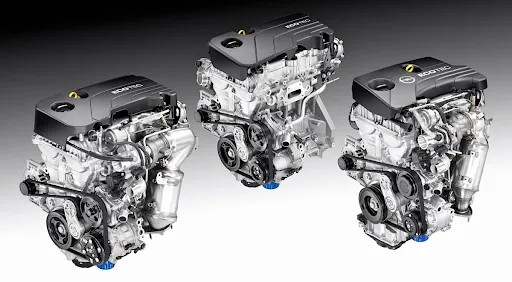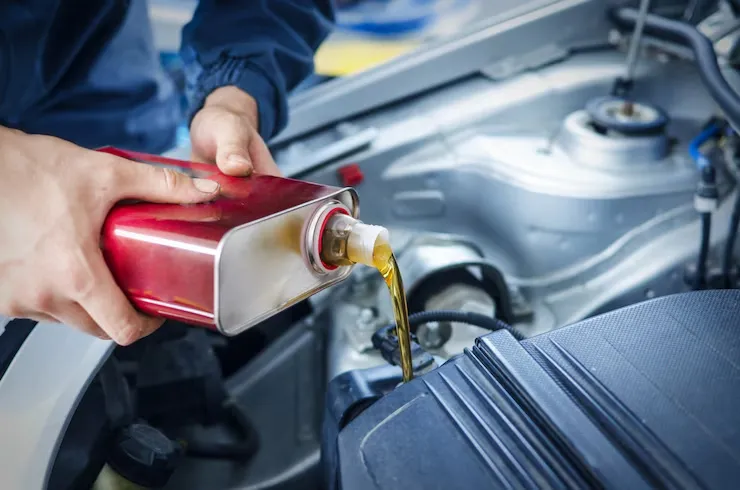Mon - Fri: 8am - 5pm, Sat - Sun: Closed

6-36 Month Warranties
We Ship Local.
Hablamos Español.
Connect with
Choosing the Right Engine Oil: A Comprehensive Guide
engine oil types
Understanding Engine Oil Types
Engine oil plays a vital role in keeping your engine running smoothly by lubricating moving parts, minimizing friction, and reducing wear. It also helps regulate engine temperature and remove contaminants. Choosing the right oil is crucial for maintaining engine performance and longevity.
There are three main types of engine oil: conventional, synthetic, and semi-synthetic. Conventional oil, made from refined crude oil, is budget-friendly but needs more frequent changes. Synthetic oil is chemically engineered for enhanced protection, especially in extreme temperatures, and offers extended service intervals. Semi-synthetic oil blends conventional and synthetic oils, providing a good balance of performance and affordability. The best choice depends on your vehicle’s specifications, driving habits, and climate conditions. Always refer to your owner's manual for guidance.



Choosing the right option depends on your vehicle’s specifications, driving habits, and climate conditions. Factors like engine type, mileage, and weather can significantly impact performance and efficiency. For instance, vehicles in colder climates might require products with specific viscosity ratings, while high-performance engines may need specialized options. Additionally, your driving style whether it's city commuting or long highway drives should guide your decision. To ensure optimal performance and longevity from engines, always consult your owner’s manual for manufacturer recommendations and consider professional advice tailored to your needs.
Decoding Oil Viscosity Grades

Viscosity refers to an oil's resistance to flow, indicated by grades such as 5W-30 or 10W-40. The first number, followed by the letter 'W' (denoting winter), indicates how easily the oil flows in cold temperatures, essential for startup protection. The second number represents the oil’s viscosity at operating temperatures, ensuring consistent performance during regular engine operation. Lower viscosity oils, like 0W-20, flow more easily in cold weather, reducing engine wear during startups.
On the other hand, higher viscosity oils, such as 10W-40, are thicker and may offer better protection at higher temperatures, particularly for engines under heavy load or in hot climates. However, they can slightly reduce fuel efficiency.
Selecting the correct viscosity grade is critical to achieving optimal engine performance and longevity, ensuring the oil matches your vehicle's specifications and driving conditions. Always consult your owner’s manual for guidance.
However, higher viscosity oils can slightly reduce fuel efficiency. Choosing the correct viscosity grade is essential for ensuring optimal engine performance and longevity. It helps maintain the right balance between protection and efficiency, matching the oil’s properties to your vehicle’s specifications and the conditions in which you drive. Whether it’s cold startups or high-temperature operations, the appropriate oil ensures consistent performance and reduces engine wear. For best results, always refer to your owner’s manual and follow the manufacturer’s recommendations for the right viscosity grade.
Selecting Oil Based on Vehicle and Driving Conditions
Choosing the right engine oil is a crucial aspect of maintaining your vehicle’s health and performance. The decision should be based on your vehicle’s specifications, driving habits, and the environmental conditions in which you operate. Engine oil is not just a lubricant; it plays a vital role in cooling, cleaning, and protecting your engine’s components. Always refer to your owner’s manual for manufacturer recommendations, as it provides specific guidance tailored to your engine’s needs. Selecting the wrong type of oil can lead to reduced efficiency, increased wear, or even long-term damage to your engine.
For high-performance vehicles or those regularly exposed to extreme temperatures, synthetic oils are often the best choice. These oils offer superior stability, resist breakdown at high temperatures, and provide enhanced protective properties. They are designed to maintain viscosity and lubrication in extreme conditions, ensuring smooth operation even under heavy loads. Synthetic oils are particularly beneficial for modern engines that demand higher lubrication standards, making them a preferred choice for drivers who prioritize performance and durability.
Conversely, older vehicles or those with high mileage may perform better with conventional oils. These oils are generally less expensive and provide adequate lubrication for engines not designed for synthetic blends. They may also include specific additives to reduce wear, prevent leaks, and help maintain seals, making them a practical choice for aging engines. For drivers looking to balance cost-effectiveness with engine protection, high-mileage oils are a good alternative, offering enhanced additives tailored to the needs of older engines.
Driving conditions are another critical factor in selecting engine oil. Frequent short trips, towing heavy loads, or driving in dusty or extreme environments can place additional stress on your engine. Such conditions may require oils with specific viscosity grades or additives to enhance wear protection, prevent sludge buildup, and optimize engine performance. By understanding and aligning these factors vehicle specifications, driving habits, and environmental conditions you can ensure your engine receives the protection and performance boost it needs to operate efficiently and reliably over the long term.
Importance of Regular Oil Changes
Regular oil changes are essential for maintaining your engine's health and ensuring optimal performance. Over time, engine oil degrades and accumulates contaminants like dirt, debris, and combustion by-products, reducing its ability to lubricate and protect engine components. Neglecting oil changes can lead to increased engine wear, diminished fuel efficiency, and even severe engine damage or failure. Consistently replacing old oil helps maintain a clean and well-functioning engine, extending its lifespan.
At Houston Engines Adhering to the recommended oil change intervals typically every 5,000 to 7,500 miles, depending on the type of oil and driving conditions is critical. Vehicles that frequently tow, drive in extreme climates, or operate in stop-and-go traffic may require more frequent changes. Many modern cars feature oil life monitoring systems that calculate precise change intervals based on driving habits and conditions, ensuring maintenance is performed at the ideal time.

Conclusion: Making Informed Oil Choices
Understanding the differences between engine oil types, viscosity grades, and the importance of regular maintenance is key to making informed decisions for your vehicle's health. Engine oil plays a crucial role in lubricating, cooling, and protecting vital engine components. Selecting the right oil ensures optimal performance and prevents unnecessary wear and tear, contributing to the overall efficiency and reliability of your vehicle.
Choosing the appropriate oil type depends on factors such as your vehicle’s specifications, driving habits, and environmental conditions. Synthetic oils are often ideal for modern engines or high-performance vehicles due to their stability and durability, while conventional oils are better suited for older or less demanding engines. Viscosity grades, such as 5W-30 or 10W-40, determine how well the oil flows in different temperatures, ensuring proper lubrication in varying conditions.
Regular oil changes are equally essential for maintaining engine health. Over time, oil degrades and becomes contaminated with dirt and by-products of combustion, reducing its effectiveness. Sticking to recommended oil change intervals usually between 5,000 to 7,500 miles, depending on oil type and usage keeps the engine clean and well-lubricated. For vehicles with oil life monitoring systems, change intervals can be adjusted based on real-time driving data for precise maintenance.
Contact us for staying informed and proactive, you can ensure your engine operates smoothly and efficiently for years to come. Always refer to your vehicle’s owner manual for manufacturer recommendations and consult with professionals when in doubt. A little attention to detail can go a long way in protecting one of your vehicle’s most critical components.
Get our latest news and promos
QUALITY ASSURED


SATISFACTION GUARANTEED

UNPARALLELED SUPPORT
Houston Engines
Proud Member



Social Media
Payments Accepted
Ship Via











